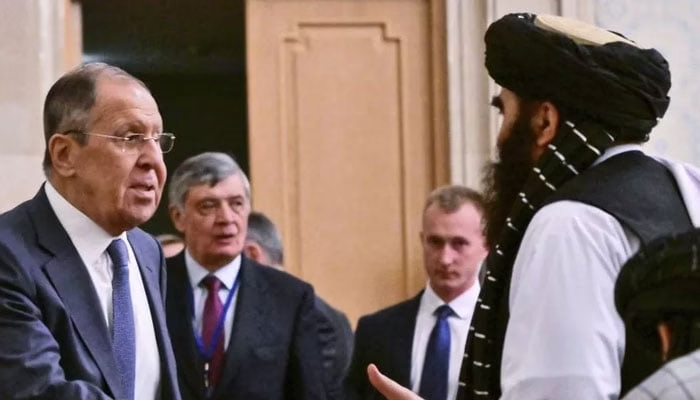In a move signaling a significant shift in international diplomacy, Russia has presented a bill in its Parliament, the State Duma, to temporarily lift the ban on local and international organizations listed as terrorist groups. This development, reported by foreign media, marks a strategic step towards enhancing cooperation with the Afghan Taliban. If the bill is passed, the Taliban may soon be removed from Russia’s list of terrorist organizations, a classification it has held since 2003.
Key Provisions of the Bill
The proposed legislation outlines a process for lifting the terrorist designation on organizations that have ceased terrorist activities. Under the bill:
- Prosecutorial Confirmation: The prosecutor must confirm that the organization has ended all forms of terrorism.
- Judicial Review: The court will review the findings and decide whether to lift the ban.
If enacted, this law would effectively pave the way for the Taliban to be delisted as a terrorist group by Russia, opening doors to enhanced political and economic relations between the two nations.
Historical Context: Taliban’s Status in Russia
Russia officially designated the Afghan Taliban as a terrorist organization in 2003. Despite this classification, recent geopolitical developments have prompted a reevaluation of this stance. Following the Taliban’s takeover of Afghanistan in August 2021, after the withdrawal of US forces, Russia has gradually sought to restore its ties with Afghanistan under Taliban rule.
Recent Developments in Russia-Afghanistan Relations
A recent meeting between Russian Defense Minister Sergei Shoigu and Afghan Deputy Prime Minister for Economic Affairs Mullah Abdul Ghani Baradar in Kabul highlighted this evolving relationship. During the discussions:
- Assurance from Russia: Shoigu assured the Afghan delegation that the Taliban would be removed from Russia’s list of banned organizations.
- Focus on Cooperation: Both sides expressed interest in expanding political and economic ties, signaling a potential new era in their bilateral relationship.
Mullah Baradar’s office issued a statement emphasizing Russia’s willingness to collaborate with Afghanistan, noting that Shoigu announced plans to deepen relations across multiple sectors.
Analysts’ Perspective
Political analysts view this move as part of Russia’s broader strategy to strengthen its influence in Afghanistan and the region. By engaging directly with the Taliban, Russia seeks to:
- Counter Western Influence: Position itself as a key player in Afghan reconstruction and governance post-US withdrawal.
- Address Security Concerns: Leverage cooperation with the Taliban to counter terrorism and ensure stability along its southern borders.
- Enhance Regional Connectivity: Support economic and political initiatives that align with its regional interests.
Russia’s Balancing Act
Despite these overtures, Russia has yet to formally recognize the Taliban government. Russian President Vladimir Putin previously referred to the Taliban as a potential ally in combating terrorism, hinting at a pragmatic approach.
This balancing act reflects Russia’s cautious yet deliberate strategy:
- Maintaining international legitimacy by not rushing to formal recognition.
- Engaging with the Taliban to secure its interests in Afghanistan and the broader Central Asian region.
Potential Implications of the Bill
If the bill is passed, the implications could be far-reaching:
- Formalized Relations: Removal from the terrorist list would signal a step closer to official recognition of the Taliban government.
- Economic Cooperation: With sanctions lifted, bilateral trade and investment could flourish, benefiting both nations.
- Regional Stability: Collaboration could help stabilize Afghanistan, addressing concerns about cross-border terrorism and extremism.
Challenges and Criticism
This development is not without controversy. Critics argue that:
- Legitimizing the Taliban: Removing the terrorist designation could embolden the group and set a precedent for other nations.
- Human Rights Concerns: The Taliban’s record on women’s rights and minority protection raises ethical concerns about normalizing relations.
- Geopolitical Risks: Strengthening ties with the Taliban might strain Russia’s relations with other global powers opposing Taliban governance.
A Gradual Approach to Recognition
While Russia has yet to officially recognize the Taliban government, its actions indicate a gradual shift towards normalization. This approach mirrors its broader foreign policy strategy of leveraging diplomatic and economic tools to assert influence in strategically important regions.
Russia’s move to present a bill for temporarily lifting the ban on terrorist organizations, including the Afghan Taliban, underscores its evolving foreign policy towards Afghanistan. As the Taliban awaits potential removal from Russia’s terrorist list, both nations stand to benefit from expanded cooperation in security, politics, and economics.
While challenges remain, this step marks a pivotal moment in Russia-Afghanistan relations, signaling a new chapter in regional diplomacy. For Afghanistan, the opportunity to engage with a major global power like Russia could prove vital in navigating its path to stability and international legitimacy.



